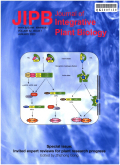- 钛学术文献服务平台 \
- 学术期刊 \
- 基础科学期刊 \
- 生物科学期刊 \
- 植物学报(英文版)期刊 \
SISTE1 promotes abscisic acid-dependent salt stress-responsive pathways via improving ion homeostasis and reactive oxygen species scavenging in tomato
SISTE1 promotes abscisic acid-dependent salt stress-responsive pathways via improving ion homeostasis and reactive oxygen species scavenging in tomato
基本信息来源于合作网站,原文需代理用户跳转至来源网站获取
摘要:
High salinity is one of the major limiting fac-tors that reduces crop productivity and quality. Herein, we report that small SALT TOLERANCE ENHANCER1 (STE1) protein without any known conserved domains is required for tomato salt tolerance. Overexpression (OE) of SlSTE1 enhanced the tolerance to multiple chloride salts (NaCl, KCl, and LiCl) and oxidative stress, along with elevated antioxidant enzyme activities, increased abscisic acid (ABA) and chlorophyll contents, and reduced ma-londialdehyde (MDA) and reactive oxygen species (ROS) accumulations compared to that of wild-type (WT) plants. Moreover, decreased K+efflux and increased H+efflux were detected in the OE plants, which induced a higher K+/Na+ ratio. In contrast, SlSTE1-RNAi plants dis-played decreased tolerance to salt stress. RNA-seq data revealed 1330 differentially expressed genes in the OE plants versus WT plants under salt stress, and the tran-scription of numerous and diverse genes encoding transcription factors, stress-related proteins, secondary metabolisms, kinases, and hormone synthesis/signaling-related proteins (notably ABA and 1-aminocyclopropane-1-carboxylate) was greatly elevated. Furthermore, SlSTE1-OE plants showed increased sensitivity to ABA, and the results suggest that SlSTE1 promotes ABA-dependent salt stress-responsive pathways by interacting with SlPYLs and SlSnRK2s. Collectively, our findings reveal that the small SlSTE1 protein confers salt tolerance via ABA sig-naling and ROS scavenging and improves ion homeo-stasis in tomato.

推荐文章
Adsorption characteristics of copper ion on nanoporous silica
Nanoporous silica
Copper ion
Adsorption
Rock chemical weathering by sulfuric acid: pathway, method and prospect
Chemical weathering
Sulfuric acid
Global climate change
Sulfate isotope
Stress-XP重音理论与汉语三大特殊句式分析
句子重音
Stress-XP理论
汉语特殊句式
最大投射
基于信令寻径式网络的高性能容错VIA设计与实现
VIA
信令寻径式网络
机群计算
并行处理
内容分析
关键词云
关键词热度
相关文献总数
(/次)
(/年)
引文网络
引文网络
二级参考文献 (37)
共引文献 (15)
参考文献 (30)
节点文献
引证文献 (0)
同被引文献 (0)
二级引证文献 (0)
1987(1)
- 参考文献(0)
- 二级参考文献(1)
1988(1)
- 参考文献(0)
- 二级参考文献(1)
1993(1)
- 参考文献(0)
- 二级参考文献(1)
1994(1)
- 参考文献(0)
- 二级参考文献(1)
1995(2)
- 参考文献(0)
- 二级参考文献(2)
1996(1)
- 参考文献(0)
- 二级参考文献(1)
1997(1)
- 参考文献(0)
- 二级参考文献(1)
1998(1)
- 参考文献(0)
- 二级参考文献(1)
1999(1)
- 参考文献(0)
- 二级参考文献(1)
2000(2)
- 参考文献(0)
- 二级参考文献(2)
2001(1)
- 参考文献(1)
- 二级参考文献(0)
2002(3)
- 参考文献(2)
- 二级参考文献(1)
2003(2)
- 参考文献(1)
- 二级参考文献(1)
2006(4)
- 参考文献(2)
- 二级参考文献(2)
2007(6)
- 参考文献(2)
- 二级参考文献(4)
2008(5)
- 参考文献(3)
- 二级参考文献(2)
2009(9)
- 参考文献(5)
- 二级参考文献(4)
2010(5)
- 参考文献(2)
- 二级参考文献(3)
2011(4)
- 参考文献(0)
- 二级参考文献(4)
2012(7)
- 参考文献(3)
- 二级参考文献(4)
2013(2)
- 参考文献(2)
- 二级参考文献(0)
2014(1)
- 参考文献(1)
- 二级参考文献(0)
2015(3)
- 参考文献(3)
- 二级参考文献(0)
2016(2)
- 参考文献(2)
- 二级参考文献(0)
2017(1)
- 参考文献(1)
- 二级参考文献(0)
2020(0)
- 参考文献(0)
- 二级参考文献(0)
- 引证文献(0)
- 二级引证文献(0)
引文网络交叉学科
相关学者/机构
期刊影响力
植物学报(英文版)
主办单位:
中国植物学会
出版周期:
月刊
ISSN:
1672-9072
CN:
11-5067/Q
开本:
大16开
出版地:
北京香山南辛村20号中科院植物所内
邮发代号:
2-500
创刊时间:
1952
语种:
eng
出版文献量(篇)
3621
总下载数(次)
1
总被引数(次)
74646
期刊文献
相关文献
推荐文献
- 期刊分类
- 期刊(年)
- 期刊(期)
- 期刊推荐
力学
化学
地球物理学
地质学
基础科学综合
大学学报
天文学
天文学、地球科学
数学
气象学
海洋学
物理学
生物学
生物科学
自然地理学和测绘学
自然科学总论
自然科学理论与方法
资源科学
非线性科学与系统科学
植物学报(英文版)2022
植物学报(英文版)2021
植物学报(英文版)2020
植物学报(英文版)2019
植物学报(英文版)2018
植物学报(英文版)2017
植物学报(英文版)2016
植物学报(英文版)2015
植物学报(英文版)2014
植物学报(英文版)2013
植物学报(英文版)2012
植物学报(英文版)2011
植物学报(英文版)2010
植物学报(英文版)2009
植物学报(英文版)2008
植物学报(英文版)2007
植物学报(英文版)2006
植物学报(英文版)2005
植物学报(英文版)2004
植物学报(英文版)2003
植物学报(英文版)2002
植物学报(英文版)2001
植物学报(英文版)2000
植物学报(英文版)1999
植物学报(英文版)1998
植物学报(英文版)2020年第9期
植物学报(英文版)2020年第8期
植物学报(英文版)2020年第7期
植物学报(英文版)2020年第6期
植物学报(英文版)2020年第5期
植物学报(英文版)2020年第4期
植物学报(英文版)2020年第3期
植物学报(英文版)2020年第2期
植物学报(英文版)2020年第12期
植物学报(英文版)2020年第11期
植物学报(英文版)2020年第10期
植物学报(英文版)2020年第1期

 免费查重
免费查重










